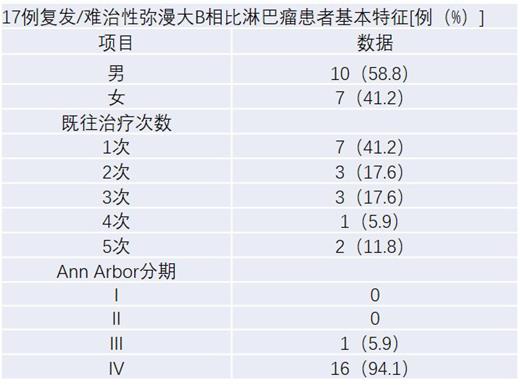Abstract:
Objective Diffuse large B-cell lymphoma (DLBCL) is the most common non-Hodges lymphoma (NHL) subtype, although R⁃CHOP treatment cured about 60% of patients. However, 40%-45% of patients do not respond to first-line therapy or relapse after an initial response, and this segment of patients has a poor prognosis. Therefore, the use of targeted drugs and the exploration of drug combination schemes are particularly important, among them, anti-CD79B antibody-drug conjugate (ADC) polatuzumab vedotin (Pola) combined with Bendamustine-Rituximab (BR) and Pola combined with R-CHOP are promising therapeutic options. To analyze the efficacy and safety of Pola combined with BR and Pola combined with R-CHOP in the treatment of relapsed/refractory DLBCL (R/R DLBCL).
Methods The single-arm, Phase II clinical study commenced at our center in May 2023. Eligible patients were R/R DLBCL patients with Ann Arbor stages 3-4, ages 36 to 88 years, who had received at least one previous standard chemotherapy regimen. The clinical data of 17 patients enrolled in our center from May 2023 to August 2023 were retrospectively analyzed, including 10 males and 7 females. The median age was 69 (ranged 36-88) years. 12 patients were treated with Pola-BR and 5 with Pola-R-CHOP, the clinical characteristics, medication regimen, efficacy and occurrence of adverse reactions were analyzed. To explore the causes of adverse reactions between the Polar-BR group and the Polar-R-CHOP group.
Results Data as of August 1, 2023, in the efficacy evaluation of 17 patients, the overall response rate (OR) was 71% (12/17) and the complete response (CR) rate was 53% (9/17). Progressive free survival (PFS), median follow-up of 45 days, with 3 cases (12%) experiencing disease progression. Compared with the Pola-BR group, the Pola-RCHOP group had a lower incidence of adverse reactions. The main adverse event was a pulmonary infection, of which 33% (4/12) were in the Polar-BR group and 25% (1/5) were in the Polar-R-CHOP group, and no severe pneumonia occurred in either group.
Conclusion Compared with the traditional R-CHOP regimen, Polar+BR/RCHOP has better therapeutic effect and a better application prospects for R/R DLBCL patients.
Disclosures
No relevant conflicts of interest to declare.


This feature is available to Subscribers Only
Sign In or Create an Account Close Modal